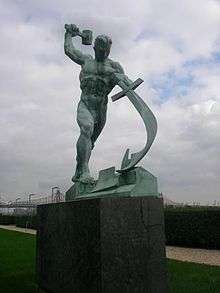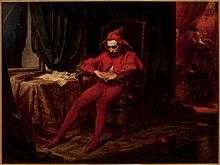Nicolas Boileau-Despréaux (1 November 1636 – 13 March 1711), commonly called Boileau, was a French poet and critic.
Quotes
- Tant de fiel entre-t-il dans l'âme des dévots ?
- Can such bitterness enter into the heart of the devout?
- Le Lutrin (1683) I, 12
- Pour soutenir tes droits, que le ciel autorise,
Abime tout plutôt ; c'est l'esprit de l'Église.- To support Thy rights, heaven-condoned, Destroy all else; that is the spirit of the Church.
- Le Lutrin (1683) I, 185
- Let him now speak, or else hereafter for ever hold his peace.
- Épitres (1701) I, 61
- Le chagrin monte en croupe et galope avec lui.
- Trouble rides behind and gallops with him.
- Épitres (1701) V, 44
- Le temps fuit, et nous traine avec soi :
Le moment ou je parle est déjà loin de moi.- Time flies and draws us with it. The moment in which I am speaking is already far from me.
- Épitres (1701) III, 47
- Tenez, voilà, dit-elle, à chacun une écaille.
Des sottises d'autrui nous vivons au palais :
Messieurs, l'huître était bonne. Adieu. Vivez en paix.- "There, take," says Justice, "take ye each a shell;
We thrive at Westminster on fools like you.
'T was a fat oyster! live in peace,—adieu." - Epître ii, reported in Bartlett's Familiar Quotations, 10th ed. (1919); translation by Alexander Pope, Verbatim from Boileau.
- "There, take," says Justice, "take ye each a shell;
- Rien n'est beau que le vrai : le vrai seul est aimable.
- Nothing but truth is lovely, nothing fair.
- Epistle 9
- Le pénible fardeau de n'avoir rien à faire.
- The terrible burden of having nothing to do.
- Epistle 11
The Art of Poetry (1674)
- L'Art Poétique
- Tout ce qu'on dit de trop est fade et rebutant.
- That which is repeated too often becomes insipid and tedious.
- Canto I, l. 61
- Souvent la peur d'un mal nous conduit dans un pire.
- Often the fear of one evil leads us into a worse.
- Canto I, l. 64
- Heureux qui, dans ses vers, sait d'une voix légère
Passer du grave au doux, du plaisant au sévère.- Happy the poet who with ease can steer
From grave to gay, from lively to severe. - Canto I, l. 75
- Variant: Happy who in his verse can gently steer
From grave to light, from pleasant to severe.- As translated by John Dryden
- Happy the poet who with ease can steer
- Ce que l'on conçoit bien s'énonce clairement,
Et les mots pour le dire arrivent aisément.- Whatever is well conceived is clearly said,
And the words to say it flow with ease. - Canto I, l. 153
- Whatever is well conceived is clearly said,
- Hâtez-vous lentement ; et, sans perdre courage,
Vingt fois sur le métier remettez votre ouvrage.- Hasten slowly, and without losing heart,
Put your work twenty times upon the anvil. - Canto I, l. 171
- Hasten slowly, and without losing heart,
- La vérité n'a point cet air impétueux.
- Truth has not such an urgent air.
- Canto I, l. 198
- Un sot trouve toujours un plus sot qui l'admire.
- A fool always finds one still more foolish to admire him.
- Variant A fool always finds a greater fool to admire him.
- Canto I, l. 232
- Le vrai peut quelquefois n'être pas vraisemblable.
- At times truth may not seem probable.
- Canto III, l. 48
- Chaque âge a ses plaisirs, son esprit et ses mœurs.
- Every age has its pleasures, its style of wit, and its own ways.
- Canto III, l. 374
- Un fat quelquefois ouvre un avis important.
- A fop sometimes gives important advice.
- Canto IV, l. 50
Satires (1716)

Honor is like an island, rugged and without a beach;
Once we have left it, we can never return.
Once we have left it, we can never return.
- Je ne puis rien nommer si ce n'est par son nom ;
J'appelle un chat un chat, et Rollet un fripon.- I can call nothing by name if that is not his name. I call a cat a cat, and Rollet a rogue.
- Satire I, l. 51
- Il plait a tout le monde et ne saurait se plaire.
- He (Molière) pleases all the world, but cannot please himself.
- Satire I, l. 94
- N'en déplaise à ces fous nommés sages de Grèce,
En ce monde il n'est point de parfaite sagesse :
Tous les hommes sont fous, et, malgré tous leurs soins,
Ne diffèrent entre eux que du plus ou du moins.- In spite of every sage whom Greece can show,
Unerring wisdom never dwelt below;
Folly in all of every age we see,
The only difference lies in the degree. - Satire 4, l. 37
- In spite of every sage whom Greece can show,
- Le plus sage est celui qui ne pense point l'être.
- The wisest man is he who is certain he is not.
- Satire 4
- Le plus fou souvent est le plus satisfait.
- Greatest fools are oft most satisfied.
- Satire 4, l. 128
- La vertu, d'un cœur noble est la marque certaine.
- Virtue alone is the unerring sign of a noble soul.
- Satire 5, l. 42
- Si vous êtes sorti de ces héros fameux,
Montrez-nous cette ardeur qu'on vit briller en eux.- If your descent is from heroic sires,
Show in your life a remnant of their fires. - Satire 5, l. 43
- If your descent is from heroic sires,
- De tous les animaux qui s'élèvent dans l'air,
Qui marchent sur la terre, ou nagent dans la mer,
De Paris au Pérou, du Japon jusqu'à Rome,
Le plus sot animal, à mon avis, c'est l'homme.- Of all the creatures that creep, swim, or fly,
Peopling the earth, the waters, and the sky,
From Rome to Iceland, Paris to Japan,
I really think the greatest fool is man. - Satire 8, l. 1
- Of all the creatures that creep, swim, or fly,
- L'or même à la laideur donne un teint de beauté :
Mais tout devient affreux avec la pauvreté.- Gold gives an appearance of beauty even to ugliness:
But with poverty everything becomes frightful. - Satire 8, l. 209
- Gold gives an appearance of beauty even to ugliness:
- La satire, en leçons, en nouveautés fertile,
Sait seule assaisonner le plaisant et l'utile,
Et, d'un vers qu'elle épure aux rayons du bons sens,
Détromper les esprits des erreurs de leur temps.- But satire, ever moral, ever new,
Delights the reader and instructs him, too.
She, if good sense refine her sterling page,
Oft shakes some rooted folly of the age.- Satire 9
- But satire, ever moral, ever new,
- L'honneur est comme une ile escarpée et sans bords ;
On n'y peut plus rentrer dès qu'on en est dehors.- Honor is like an island, rugged and without a beach; once we have left it, we can never return.
- Satire 10, l. 167
- Et le Mien et le Tien, deux frères pointilleux,
Par son ordre amenant les procès et la guerre,
En tous lieux de ce pas vont partager la terre ;
En tous lieux, sous les noms de bon droit et de tort,
Vont chez elle établir le seul droit du plus fort.
External links
This article is issued from
Wikiquote.
The text is licensed under Creative
Commons - Attribution - Sharealike.
Additional terms may apply for the media files.







